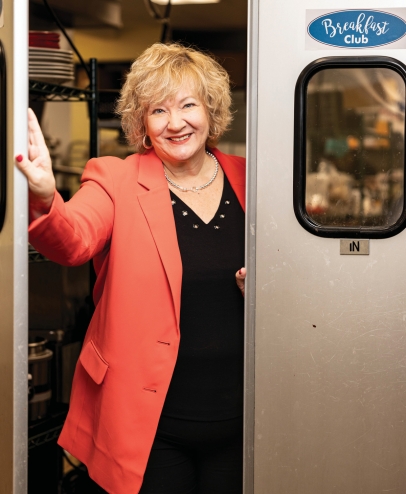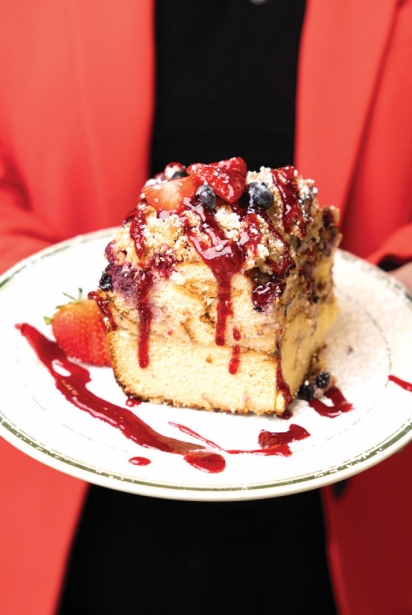Breakfast Club's Penny White
IN THE 1990S, seeing that speed trumped quality when it came to breakfast in Southeastern Michigan, Penny White set out on a mission to satisfy what people were looking for: something fresh, affordable and sophisticated, somewhere between hash browns from a flattop and Eggs Benedict out of a five-star hotel kitchen.
She made that vision a reality in 1999 when she started the Breakfast Club of Clawson.
The night before they opened, a snowstorm swept through. White and her husband, Tom, had put in another 16-hour day prepping the place for its debut. Looking around, every coat of paint, every nail on the wall had been her decision or her doing, all while still being a mother to young children.
In the steel morning of that late December day, they turned the sign to open and waited — a clean counter waiting for customers, the eggs in their cartons like soldiers. They served 12 people in total. The next day, 120. As White puts it, “We outgrew that place the second day.”
White’s wild success seems born from a self-replenishing supply of energy and curiosity, proving that passion is motivation that always comes back around. She’s been in the industry since she was 24 and is still inventing, still looking ahead while reflecting on what brought her to this point in her long restaurant career.
White was born in Dearborn, but left the state twice—moving to London and Chicago—to further her career in restaurant management and cooking. She oversaw the TGI Fridays in London, giving her a dose of corporate management tactics. She also worked on the team of fine-dining restaurants in Chicago in the 1980s, including Gordon, then got an even closer look at the fine-dining world back home in Michigan under the first celebrity chef here, chef Douglas Grech, better known as Chef Duglass, the then-chef-owner of the Southfield restaurant Duglass. She let these experiences sit with her, layering, stewing, inventing new expression like a Bordelaise. They helped the Breakfast Club eventually grow from one location to eight.
“Never stop learning; listen to your guests; tell your employees how much they mean to you; keep your place clean; take a break; take care of yourself.”
Now an industry maven, White is confident in her philosophies and ebullient in her advice giving: “Never stop learning; listen to your guests; tell your employees how much they mean to you; keep your place clean; take a break; take care of yourself.”
She has used lessons from the corporate restaurant world (“No grain of sand should get into the oyster”—the oyster being the customer), and from fine dining, and made a mold that works for a small business. She attributes her success to defining this niche, then filling it with fresh food and healthier options. Beyond that, White farms the details, keeping an eye on what people are enjoying in the culture and developing her own distinctive way, to give her restaurants that elusive thing people call the feel. An example: She urges her staff to create an atmosphere she calls “friendly but not familiar.” She wants her teams to know their guests and greet regulars but to keep the experience elevated and private too. Like anyone who’s seen success and worked for it, her speech is full of maxims and flows quickly. This gives even her phone presence a real shine. In part, it’s this recurrence of what can feel like patented advice that shows she’s a consummate editor, a curator of what’s important. She’s also simply a genuine lover of food and the culinary arts, often going home after meals out to re-create a better version of dinner, because she knows she’ll probably win the day. This seriousness for pushing food to be its most memorable is the true hunger of a chef.
Training with her at a Breakfast Club involves spending three hours just talking about and trying the food on the menu. She believes (correctly, of course) that her team deserves a lot of the spotlight: “I couldn’t do this without them.” In grad school, she was assigned the Mary Kay book on managing people and learned a lesson on leading that she’s held on to since. She recalls the phrasing as: “Pretend each one of your employees is coming in every day with a sign that says ‘make me feel important.’” That’s why she “hires nice.” And she watches how things are run in her kitchens—any stress from there that leaks in her servers’ day will be brought into the dining room—and that’s a grain of sand in an oyster.
White hasn’t only worked in the restaurant industry; she taught restaurant-management courses at Schoolcraft College. She also hasn’t only served breakfast. In 2015, she opened Wicked Table, a dinner establishment. She wanted to try nights: “I always say at breakfast, customers don’t come to eat, they come to visit. At nighttime, we want to have a good time. We want to try different foods. When you go to breakfast, you go to the same restaurant all the time. Nighttime it’s harder to draw people, because they want to try different things, so you have to keep people’s interests. And that’s what I liked about it, because I love food.”
She has since sold Wicked Table—a solid offer came at a time when she felt her other restaurants weren’t getting enough of her attention. She retired in 2020, still owning the Breakfast Clubs in Novi and Troy (which she still does today), but it was short-lived. She returned to help both restaurants stabilize during COVID lockdowns. Her days then were long (sometimes up to 16 hours), but she said that when back in her element, she was uplifted, ecstatic. It made her certain that retirement isn’t for her: “This is what I do; this is what I love.”
Hanna Guido is an editor and freelance writer with roots in Detroit.





